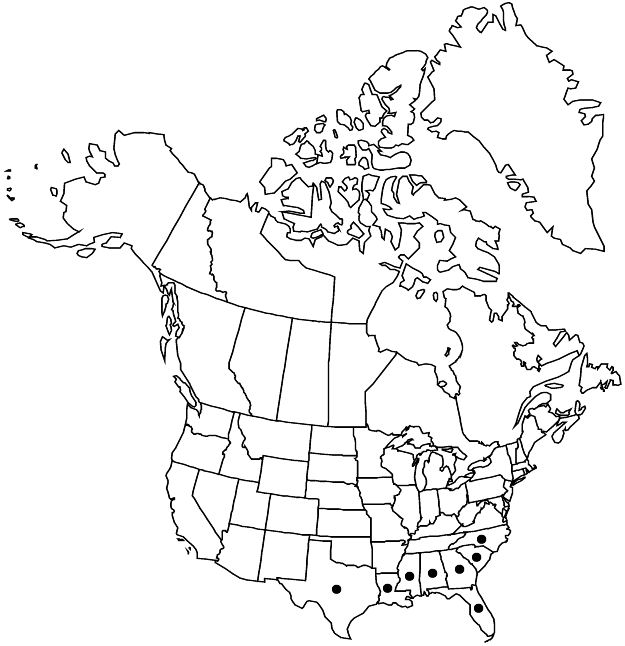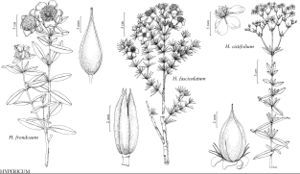Difference between revisions of "Hypericum cistifolium"
in J. Lamarck et al., Encycl. 4: 158. 1797.
FNA>Volume Importer |
FNA>Volume Importer |
||
| Line 18: | Line 18: | ||
|name=Hypericum opacum | |name=Hypericum opacum | ||
|authority=Torrey & A. Gray | |authority=Torrey & A. Gray | ||
| − | }}{{Treatment/ID/Synonym | + | }} {{Treatment/ID/Synonym |
|name=H. punctulosum | |name=H. punctulosum | ||
|authority=Bertoloni | |authority=Bertoloni | ||
| − | }}{{Treatment/ID/Synonym | + | }} {{Treatment/ID/Synonym |
|name=H. rosmarinifolium | |name=H. rosmarinifolium | ||
|authority=Lamarck | |authority=Lamarck | ||
| Line 39: | Line 39: | ||
|elevation=0–300 m | |elevation=0–300 m | ||
|distribution=Ala.;Fla.;Ga.;La.;Miss.;N.C.;S.C.;Tex. | |distribution=Ala.;Fla.;Ga.;La.;Miss.;N.C.;S.C.;Tex. | ||
| − | |discussion=<p>Hypericum cistifolium is woodier in habit than H. sphaerocarpum and has shorter leaves, smaller flowers, narrower sepals, narrower capsules, and smaller seeds.</p> | + | |discussion=<p><i>Hypericum cistifolium</i> is woodier in habit than <i>H. sphaerocarpum</i> and has shorter leaves, smaller flowers, narrower sepals, narrower capsules, and smaller seeds.</p> |
|tables= | |tables= | ||
|references= | |references= | ||
| Line 63: | Line 63: | ||
|publication year=1797 | |publication year=1797 | ||
|special status=Endemic;Selected by author to be illustrated | |special status=Endemic;Selected by author to be illustrated | ||
| − | |source xml=https://jpend@bitbucket.org/aafc-mbb/fna-data-curation.git/src/ | + | |source xml=https://jpend@bitbucket.org/aafc-mbb/fna-data-curation.git/src/8f726806613d60c220dc4493de13607dd3150896/coarse_grained_fna_xml/V6/V6_133.xml |
|genus=Hypericum | |genus=Hypericum | ||
|section=Hypericum sect. Myriandra | |section=Hypericum sect. Myriandra | ||
Revision as of 17:45, 18 September 2019
Shrubs, erect, unbranched or with relatively short branches and sometimes 1–2 branches ascending from proximal nodes, 5–13 dm. Stems: internodes 4-lined at first, then terete. Leaf blades narrowly oblong or narrowly elliptic-oblong to triangular-lanceolate, 15–40 × 2–10 mm, base not articulated, cuneate to subcordate, margins recurved, apex subacute to rounded, midrib with 1 pair of branches. Inflorescences corymbiform to cylindric, (7–)15–65-flowered, narrowly branched, sometimes with 3–65-flowered dichasia from 1–2 proximal nodes and relatively short, flowering branches from further 1–4 nodes. Flowers 7–12 mm diam.; sepals persistent, not enclosing capsule, 5, obovate or broadly elliptic to oblong, unequal, 2–4 × 1–1.7 mm; petals 5, bright yellow, oblanceolate, 5–8 mm; stamens (some or all) persistent, 30–50; ovary 3-merous, placentation parietal. Capsules ovoid-cylindric to broadly ovoid, 4–6 × 3–4 mm. Seeds not carinate, 0.6 mm; testa reticulate to linear-foveolate. 2n = 18.
Phenology: Flowering spring–early fall (Apr–Oct).
Habitat: Pine flatwoods, margins of bogs, swamps, and marshes, ditches, on sand, coastal plain
Elevation: 0–300 m
Distribution

Ala., Fla., Ga., La., Miss., N.C., S.C., Tex.
Discussion
Hypericum cistifolium is woodier in habit than H. sphaerocarpum and has shorter leaves, smaller flowers, narrower sepals, narrower capsules, and smaller seeds.
Selected References
None.
